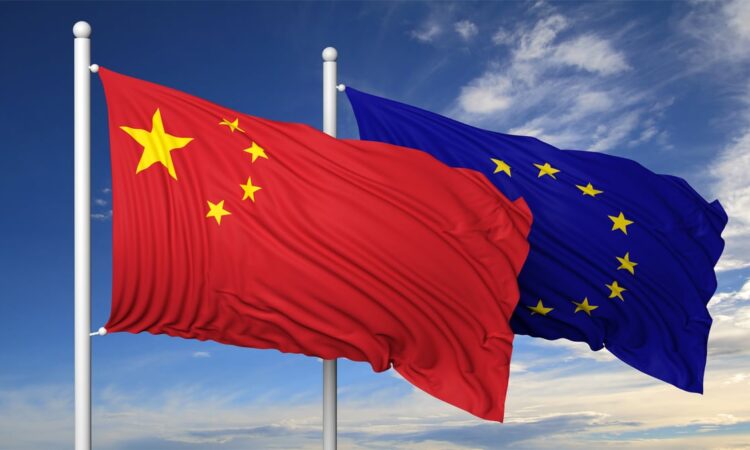
The EU began imposing tariffs of up to 37.6 percent on Chinese electric vehicles (EVs) last Friday (5 July), affecting $11.5bn [€10.6bn] of Chinese EV exports. In response, China threatened retaliation, starting with pork, particularly affecting Spain. It’s likely China will expand its retaliation list to include European big engine cars, dairy products, wine and cognac. The EU-China trade war appears imminent.
While the trade war seems imminent, an all-out conflict in the near future is unlikely.
To Chinese policymakers, the EU represents an intermediate zone in countering US hegemony. The US is China’s principal rival in foreign policy, classified under Marxist dialectics as the major contradiction, while the EU is seen as the minor one.
China is likely to avoid a full-scale retaliation similar to its 2018 response to the US due to deflationary pressures on its economy and its reliance on the EU market. The EU is China’s largest export market and crucial for Chinese outbound investments due to its legal environment, large consumer base and high-tech industries, making it highly attractive to Chinese entrepreneurs. Chinese policymakers are attempting to defuse tensions by sending high-ranking officials for environment and climate dialogues in the EU, seeking diplomatic solutions.
Therefore, the next four to six months may provide a window for normal EU-China trade relations
China may refrain from extensive retaliations, preferring peaceful resolutions through lobbying and dialogue. The outcome of the US presidential election will significantly influence China’s stance, with a potential Trump 2.0 administration likely reigniting US-China trade tensions. Furthermore, the rise of extreme rightwing movements in France and elsewhere in Europe makes Chinese policymakers cautious about exacerbating nationalism and protectionism.
The rise of extreme rightwing movements in France and elsewhere in Europe makes Chinese policymakers cautious about exacerbating nationalism and protectionism
However, this period of cautious observation will likely be short-lived. EU-China trade tensions are expected to intensify into a prolonged conflict starting from early 2025. Two systemic factors contribute to this escalation and prolongation. Firstly, EU-China economic competition is structural; China no longer dominates only low-end production but competes globally with high-end manufactured goods of strategic importance such as EVs, batteries, telecom equipment, fast rail systems, airplanes, and wind turbines. The EU has implemented legal measures to counter China’s subsidized advantages. Reciprocity in openness is also seen as lacking from China’s side, prompting the EU to act against what it perceives as unfair practices.
Secondly, geopolitical factors are now influencing EU-China relations. A geopolitical rivalry has emerged between the “Geopolitical European Union” and an assertive, authoritarian China.
While Chinese policymakers traditionally denied conflicts of geopolitical interest with the EU, this perception shifted after 2019, particularly with the transformation of the European Commission under Ursula von der Leyen, who secured a second tenure for 2024-2029.
China’s “17+1” initiative, initially seen as encroaching on the EU’s central and eastern European interests, has strained relations. Events like the China-Lithuania diplomatic row and Russia-Ukraine conflict further strained relations, leading to a reduced “17+1” to “14+1” format.
China’s strategic partnership with Russia has altered perceptions in the EU, viewing China more as a systemic rival and less as a partner. This shift prompts the “Geopolitical Europe” to resist China’s economic and political influence, particularly its statist model.
Long-term economic conflict
These systemic factors will likely lead EU-China relations into a long-term economic conflict. Beijing will find it increasingly unacceptable as its new quality productive forces are constrained and hundreds of billions in exports to Europe are affected. Beijing may strategically target EU sectors for retaliation, escalating multiple trade conflicts. With the EU’s exports to China valued at €224bn, not counting services and investments, China has substantial leverage.
With the EU’s exports to China valued at €224bn, not counting services and investments, China has substantial leverage
A protracted EU-China trade war would have profound implications.
Firstly, it could disrupt the atmosphere within the multilateral trading system, notably affecting the WTO, where both the EU and China play crucial roles.
Secondly, the EU risks losing a historically ardent supporter of European integration. This would significantly impact the EU, especially with the rise of far-right movements within Europe, if China opts to work with individual member states rather than EU institutions—a strategy similar to past instances involving Donald Trump.
There are already clear indications of this approach, such as the episode when Emmanuel Macron accompanied Ursula von der Leyen on a state visit to China, during which she received “a cold shoulder”.
Thirdly, a prolonged trade conflict could reshape global supply chains, potentially leading to a partial economic decoupling between the world’s second (China) and third (EU) largest economies.
An enduring trade war would also affect China’s domestic politics and foreign policy, closing off avenues for engagement with the liberal world and potentially leading to closer alignment with Russia amid tensions in East Asia (Korean Peninsula, Taiwan Strait). This could result in the formation of two military blocs in East Asia: China-Russia-North Korea vs. US-Japan-South Korea. In summary, a protracted trade war would severely disrupt peace in East Asia and have global repercussions.
In the coming years, the EU, based on its values, will most probably contend with challenges including a revanchist Russia, a populist resurgence under Trump 2.0, the rise of far-right movements, and a prolonged economic conflict with China — an authoritarian giant commanding the world’s second-largest consumer market. The fate of global trade largely rests in the hands of EU and Chinese decision-makers, but time is running out as they seem destined for a prolonged trade war.






